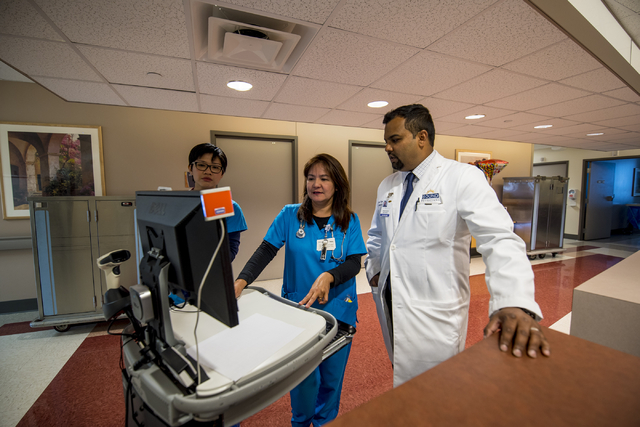
Shivesh Kumar considers medicine the family business.
Kumar, 34, who grew up in Orange County, Calif., and moved to Las Vegas three years ago, always knew he would have some type of career in medicine. He chose to become a doctor and serves as a chief hospitalist at Spring Valley Hospital Medical Center.
Kumar’s aunt worked as a rehabilitation physician, and he has other family members in the medical field. His parents are microbiologists who have worked in clinical laboratories and diagnosed cultures.
“They both were teachers and professors of that in India,” Kumar said. “When I was growing up, medicine was the family business. It was something I have always trained my eye on since Day One. Even though I studied in many different fields, medicine has always been a passion and always been my end goal. I’m lucky to be doing what I’ve always wanted to do.”
Kumar studied at UCLA before attending medical school at St. Matthew’s University School of Medicine in Orlando, Fla. From there, Kumar did a three-year residency at the University of Alabama at Birmingham and spent most of his residency working at Vaughan Regional Medical Center in Selma, Ala.
Kumar considered other careers in medicine and did extensive research in cardiac imaging. He said he conducted delicate measuring of coronary arteries with a CT scanner and spent time with basic medical research in the lab, squirting petri dishes and waiting for cultures.
“I have a tremendous amount of respect for researchers because it takes a tremendous amount of talent, institution, patience and skill to do that kind of work,” he said. “It’s better to pursue a passion I was really good at. I enjoyed medicine and seeing patients a thousand times more — actually, in seeing the patients every day. I might not be doing major clinical breakthroughs in research, but whenever one of my patients walks out satisfied or happy with their care, that’s instantly more rewarding.”
Like many physicians, Kumar says he vacillated on what type of doctor he wanted to be. Initially, he said he wanted to be a surgeon.
Kumar chose internal medicine and working as a hospital-based physician, also known as a hospitalist.
“The reason I like hospitalist medicine is that it combines the best of internal medicine, which allows me to think about a problem or figure out how to treat a patient over a long period of time,” Kumar said. “Combined with being in the hospital and the emergency medicine, where you have acute conditions that need immediate decisive treatment, I like both worlds in the hospital. It allows me to have more control over how much time I have with my patients.
“Doctors just don’t have time to spend with their patients in a clinic anymore. I saw that in my training that it was a reality of the current financial climate. In hospital medicine, I spend as much time as I need to or want to with each of my patients every day. That flexibility is invaluable … I think it’s profoundly rewarding.”
What’s the reward? Kumar said it’s seeing an immediate or nearly immediate result from the hard work and making a correct diagnosis.